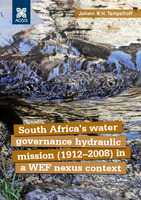South Africa’s water governance hydraulic mission (1912–2008) in a WEF-Nexus context
Contributor(s)
Tempelhoff, Johann (editor)
Language
EnglishAbstract
Geologists, physicists and ecologists currently promote the idea of a post-Holocene epoch – the Anthropocene. As a result of constant innovation and modernisation in the fields of engineering, natural science, management studies and environmental studies there has been a growing awareness of the intrinsic interaction between humankind and the environment. Humankind has become part of the environmental dynamics, to the extent that they are literally able to change ecosystems. Nowhere is the impact more evident than in the anthropogenic engagement with the hydrosphere – from the smallest pool of water to the earth’s atmosphere. Comprehensive infrastructure development in water and sanitation, the growing trend to seek additional resources in the form of groundwater, desalinated seawater, and recycled wastewater, as well as special attention being given to capturing and preserving rainwater, bear evidence of a timely response to climate change, population growth and rapid development in many water-stressed regions of the world.
The purpose of the book is to provide a historical overview of the manner in which South Africa’s water resources have been governed from a time when the Union of South Africa was formed, in 1910, up to 2008, a time of a growing global awareness of the potential impact that climate change may have on water resources in a key region of southern Africa, notable for increasing levels of aridity and more erratic rainfall patterns. This focus on the history of water affairs in South Africa makes it possible for scholars to comprehend the contemporary transitions made in the country’s water governance system since the establishment in 2014 of the Department of Water and Sanitation. The focus is on the Water–Energy–Food nexus, a strategy which holistically contemplates the governance and use of water from the perspective of the interconnection between water, energy and food as resources.
Keywords
DWAF; panarchy; Water affairs; drought; Orange River; SAWHAR WLC; Hydraulic mission; hydropowerDOI
10.4102/aosis.2018.BK75OCN
1100489432Publisher
AOSISPublisher website
https://books.aosis.co.za/index.php/obPublication date and place
Durbanville, 2018Classification
Environmental science, engineering and technology


 Download
Download Web Shop
Web Shop